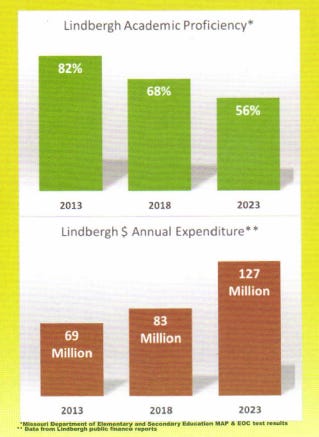Below is an article that was published recently published on substack by Lindbergh Transparency. I found this article interesting since I am unfamiliar with the history of public education in Kansas City, but I am familiar with the first figure since it is from David Randelman’s and my door hanger. I cannot vouch for the information shared in the article, but believe it potentially has merit that could help Lindbergh citizens make better-informed decisions.
Unsettling Parallels – Where is Lindbergh Trending?
MAR 17, 2024
This is a screenshot of a portion of a door flyer I recently received. It shows that academics at Lindbergh have dropped as spending has increased.

This reminded me of a very expensive Missouri court experiment that lasted from 1985 to 2003. The goal was to demonstrate that equal educational opportunity could be achieved if a school was properly funded. The school district was Kansas City, Missouri, School District (KCMSD).
The court remedies were to impose requirements to improve and equalize the educational facilities and programs of KCMSD. Although the final decision on this court case came down to what power and authority the courts had as well as a differentiation between de jure and de facto discrimination, the reason this case came to mind is because the money that was received to improve and equalize facilities and programs failed to improve the academic quality of the education at these schools.
Why did the KCMSD fail to improve student outcomes? In the book “Complex Justice: The Case of Missouri v. Jenkins,” author Joshua M. Dunn finds four main reasons for the failure:
· There was too heavy of a reliance on ‘educational experts’ and their ‘best practices’.
· The court ignored the preferences and complaints of black parents who wanted to ensure the achievement of basic skills for their children rather than program focuses like classical Greek, Asian studies, agribusiness, and environmental studies.
· The schools received all the money they could ever ask for…a total of over $2 Billion dollars. This led to excessive and lavish spending and administrators became hopelessly corrupt.
· And, there was a quota system which sadly limited access for students to the schools.
Under this court-imposed experiment, property taxes doubled and there was an income tax surcharge on everyone who lived or worked in the city. The school facilities were amazing, teachers were well paid, and the programs were engaging for students. Despite all this, test scores continued to drop, and racial isolation was not solved.
While schools must be properly funded and maintained, the public must remain attentive and avoid overfunding schools (or any government entity for that matter) to minimize any opportunity for waste, fraud, and corruption. Also, academic institutions like Lindbergh must have a challenging yet easy to understand and evaluate, pre-determined, measurable goal to demonstrate the academic success of the school and justify the spending of our tax dollars. Per Lindbergh’s Continuing School Improvement Plan (CSIP), the current academic goal of Lindbergh is simply to exceed state averages on state required assessments.
It is worrisome that in recent years, Lindbergh’s academics have declined considerably as new programs with unmeasurable goals were added. For example, there has been a significant allocation of time and resources to Social-Emotional Learning (SEL) which has no Missouri standards nor a pre-determined, measurable goal for success. Also, the district is keenly focused on the endless aspiration of “equity” which must make district employees feel as though they are stuck in “The Scream” as they work to advance this concept that is neither objectively measurable nor ever truly obtainable.

With Prop R 2024, the district is asking for even more money to achieve equitable facilities and add a specialty AgTech center with no pre-determined, measurable goal for its success.
Since 2018, the Lindbergh community has been asked by this administration to:
· Rely on the “education experts”,
· Disregard declining test scores that show student achievement of basic academic skills,
· Approve more and more money to ensure equity between school facilities, and
· Trust the administration that there is no discrimination at Lindbergh (NOTE: the Missouri Attorney General issued a cease and desist letter for the quota-based admissions for the Lindbergh gifted program).
This is not a doom and gloom prediction for Lindbergh. Yet there are some unsettling parallels between the failure that happened in Missouri v. Jenkins and the trend happening at Lindbergh today.